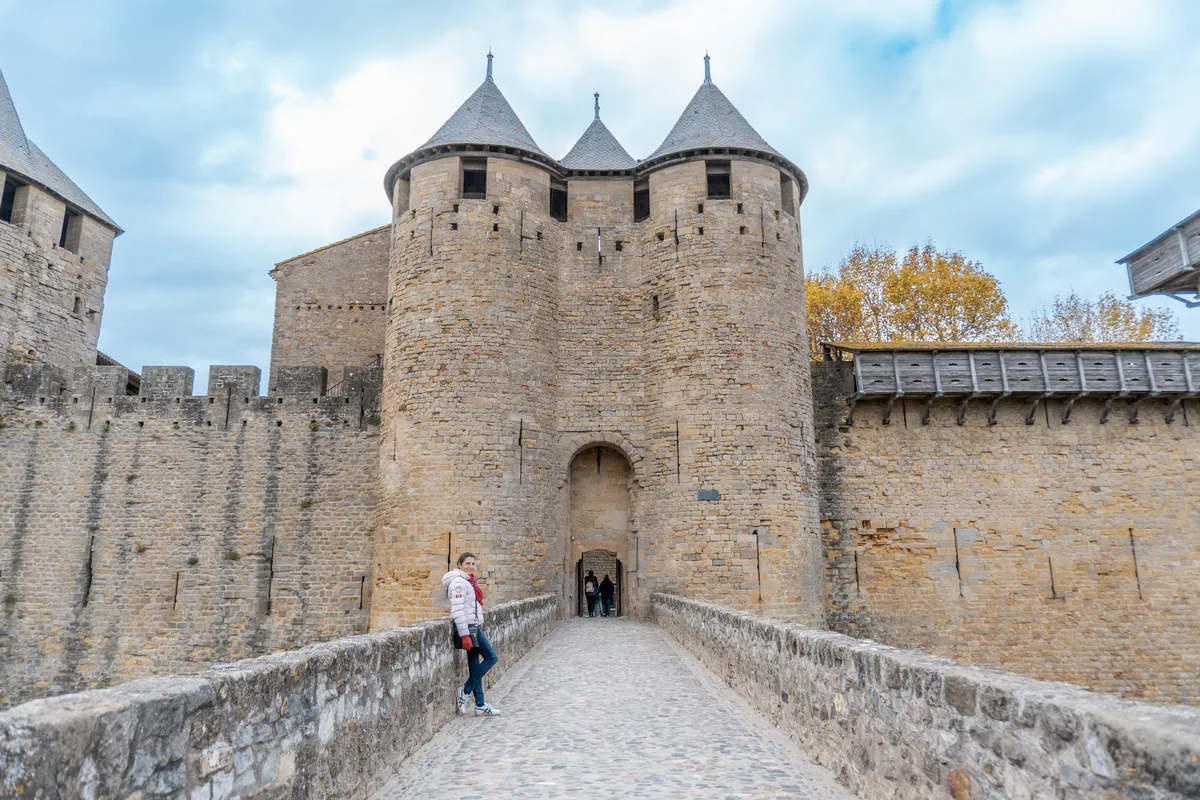At diegoenfrance.com, I share my real experience as a local and traveling through France for more than 10 years, to help you discover the best of the country in an authentic way without wasting time on endless searches.
Why visit France?
Because France combines history, landscapes, gastronomy and activities for all ages. Tourism that can be experienced with all five senses.
In this article, you’ll find:
- The most inspiring and practical reasons to choose France for your next trip.
- A complete tour: villages, castles, caves, parks, gastronomy and more.
- Content designed for those who plan authentic vacations, as a couple or with family.
Reasons | Ideal for | What you will enjoy |
Leisure and adventure parks | Families, groups, active travelers | Fun, nature, games |
Charming villages | Seekers of authenticity, quiet travels | Living history, markets, architecture |
Castles and heritage | History lovers, curious travelers | Fortresses, visits, shows |
UNESCO Sites | Culture, art, history | Living monuments, landscapes, museums |
Gastronomy | Lovers of good food and drink | Cheeses, wines, markets, rituals |
Accommodations with character | Those looking for complete experiences | Casas rurales, guest houses, castillos |
Sustainable tourism | Those who value respect for the environment | Tranquility, quality, diversity of landscapes |
✨ Join my Facebook group to discover and share the most charming villages in France. Click here
Why visit France: a destination that captivates and always surprises
France has been, for years, the most visited country in the world. And that’s no coincidence.
There’s something about this place that fascinates, enchants and makes people come and want to return. It could be its dreamy landscapes, its vibrant culture, its food that makes you fall in love, or simply that French art of living that turns every moment into something special.
And if you think you already know France just because you’ve been to Paris… well, let me tell you that’s just the gateway.
The best is beyond: on country roads, in soulful villages, in open-air markets, in experiences you won’t find in guidebooks.
Beyond Paris: the France few know
I live here in France. And for years I’ve been traveling around the country with my family, discovering those hidden corners that don’t appear in brochures but make you feel like you’ve truly traveled.
Today I want to tell you why France, in my opinion, is a destination you have to visit at least once in your life. And if you’ve already been, come back!
👉 Read my Guide to the Top 12 Places to visit in France outside Paris
In 2024 France received 102 million international visitors, once again consolidating itself as the number one tourist destination on the planet, according to data from the World Tourism Organization (UNWTO).
For at least the last 10 years, France has been the most visited country in the world, proving the strength and diversity of its offer.
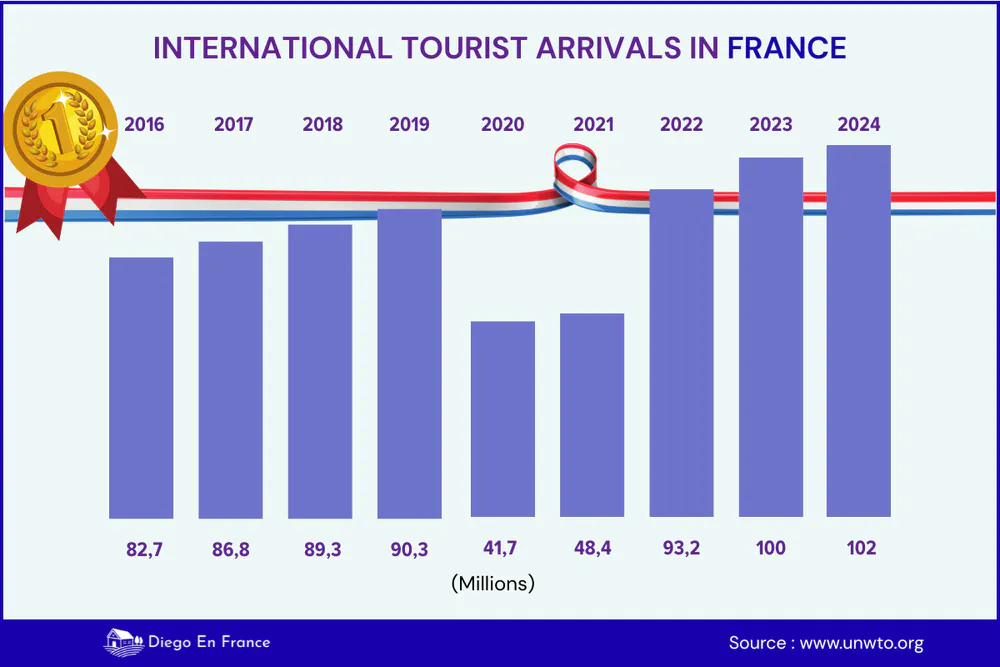
⭐ If you’re planning your trip and want to make the most of it, don’t miss this essential guide: practical advice, real tips, and everything a tourist needs to truly enjoy France.
👉 The First Complete Guide with real Advice and Tips for tourists in France
Top 15 reasons to visit France
France is a country that has it all: diverse landscapes, heritage, culture, unique flavors and an art of living that wins people over.
Here’s a list of some of the main reasons that usually make visitors fall in love.
- France is home to Paris, the City of Light.
- France dazzles with its majestic castles.
- Its charming villages are unique and authentic.
- The theme and leisure parks offer fun for the whole family.
- France surprises with the diversity of its landscapes.
- French gastronomy is an art.
- Local markets burst with unique colors, aromas, and flavors.
- For its UNESCO World Heritage sites.
- France offers an enormous variety and excellent quality of accommodations.
- Its art and culture are incomparable.
- France offers thousands of outdoor adventures for the whole family.
- For its infrastructure designed for travelers.
- For its strategic location in Europe.
- For the warmth and hospitality of its people.
- For its sustainable and decentralized tourism model.
Why visit France : A local’s vision
In this article, unlike traditional guides, I’m going to share the reasons that, after years of living, traveling, and exploring France with my family, truly feel special to me. .
Those reasons that don’t always appear in brochures, but that make all the difference when you come to discover this country.
I invite you to discover them in the following sections: places, experiences, and moments that, for me, make visiting France worthwhile.
France in numbers: the success of a unique tourism model
If you’re wondering why tourism here is a global success story, and why you should come to France, these figures speak for themselves:
- 102 million international visitors came to France in 2024.
- 10 years and counting — that’s how long France has been the most visited country in the world.
- 40,000 castles are scattered across the country.
- More than 200 charming villages await you in France.
- 650 leisure and theme parks offer fun for all ages.
- 500 accrobranche parks invite you to adventure among the trees.
- More than 100 tourist caves adapted for visitors.
- 58,100 accommodations certified by the Gîtes de France® network.
- More than 50 UNESCO World Heritage sites enrich the landscape.
- 654 Michelin-starred restaurants showcase France’s culinary excellence.
- More than 1,200 varieties of cheese are waiting to be discovered.
👉 Want a quick and visual summary? Check out this exclusive graphic that sums up the key figures that make France a unique tourism destination. Perfect for inspiring you and planning your trip.
Because in France everything is designed for travelers: Tourism infrastructure
When a country manages to welcome millions and millions of visitors each year, it’s not just because of its landscapes or its history. It takes being very well prepared.
From the big cities to the smallest villages, the country has impeccable tourism infrastructure, designed to make your experience comfortable, safe, and enjoyable. And believe me, you can feel it in every detail.
What’s more, it’s not all about Paris. For years there has been a clear intention to decentralize tourism, so that it’s not concentrated in just a few places and is spread more evenly across the country.
This translates into:
- Distributed services: in every region you’ll find top-level accommodation, gastronomy, and activities.
- Active tourist offices: even in the smallest villages, you’ll always find someone to guide you.
- Efficient transportation: well-marked roads, fast trains, regional airports, bike rentals in villages.
- Diversified, accessible, and family-friendly tourism: with picnic areas, playgrounds, recreational parks, public restrooms — all thoughtfully designed for those of us traveling with kids.
That’s one of France’s greatest strengths: you can lose yourself in a tiny village in the south and still find everything you need to enjoy it to the fullest.
Because in France fun has no age: Leisure and adventure parks
If you thought France was just history, castles, and museums… I have a surprise for you!
Because here you’ll also find big-time fun for everyone. France is the European country with the most leisure parks and family recreational activities.
👉 In France there are 650 theme and leisure parks spread throughout the country. Source: Le Syndicat National des Espaces de Loisirs, d’Attractions et Culturels (SNELAC)
And it’s not just about rides. Here the concept of a “park” goes much further: places designed for total enjoyment and relaxation, with green spaces, picnic areas, shows, interactive games, nature, history, and adventure.
A perfect combo if you’re traveling with your family.
Some examples of the most visited parks
- Disneyland Paris: the classic. Magical and spectacular.
- Parc Astérix: perfect for laughing, screaming, and getting a little wet, inspired by the characters from the famous Gallic comic.
- Puy du Fou (Loire): no roller coasters, but breathtaking historical theatrical productions.
- Futuroscope (Poitiers): technology, science, futurism, special effects, and immersive experiences for all ages.
But beyond these big parks that everyone knows, there are hundreds of smaller options, less crowded, with a family-friendly atmosphere and much more personal attention.
I’m talking about those human-scale places where you don’t have to wait in endless lines, where everything is designed for stress-free fun, and where, more often than not, the owners themselves greet you with a smile.
Well-maintained places, with impeccable facilities and original attractions that will surprise you.
Up next I’ll share a bit about some leisure parks you can enjoy.
Alternative theme parks: nature, animals, and lots of creativity
In addition to the big parks everyone knows, France is full of alternative theme parks — original, accessible, and perfect for spending an unforgettable day with the family, far from the crowds.
These are spaces created with care, designed to be enjoyed at a relaxed pace, where the experience isn’t about adrenaline but about connecting with nature, free play, learning, and surprise.
💙 Why visit France: for its leisure and adventure parks. Because France offers fun for all ages, from iconic large parks to hidden gems on a human scale where you can enjoy yourself without the crowds.
Acrobranche: adrenaline in the trees
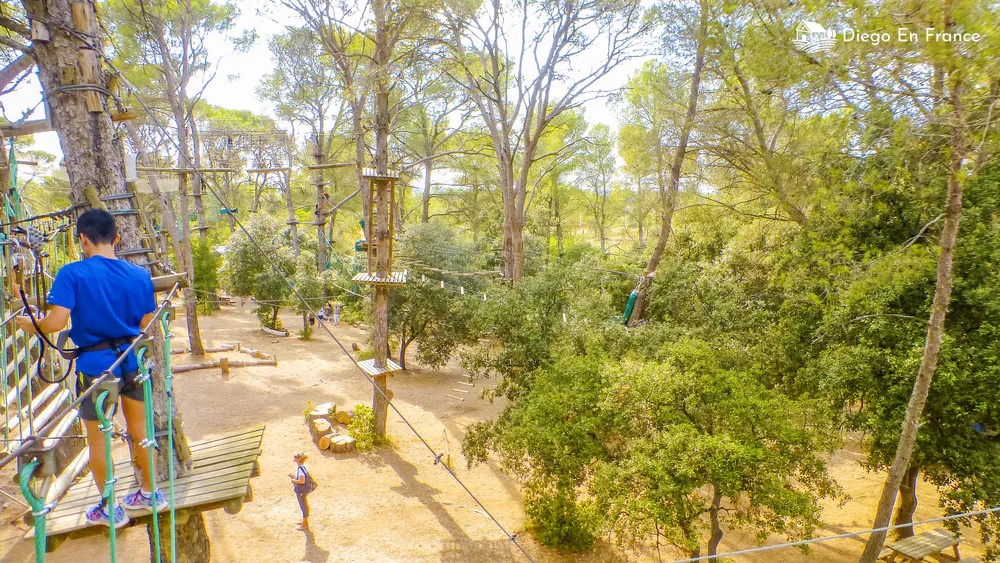
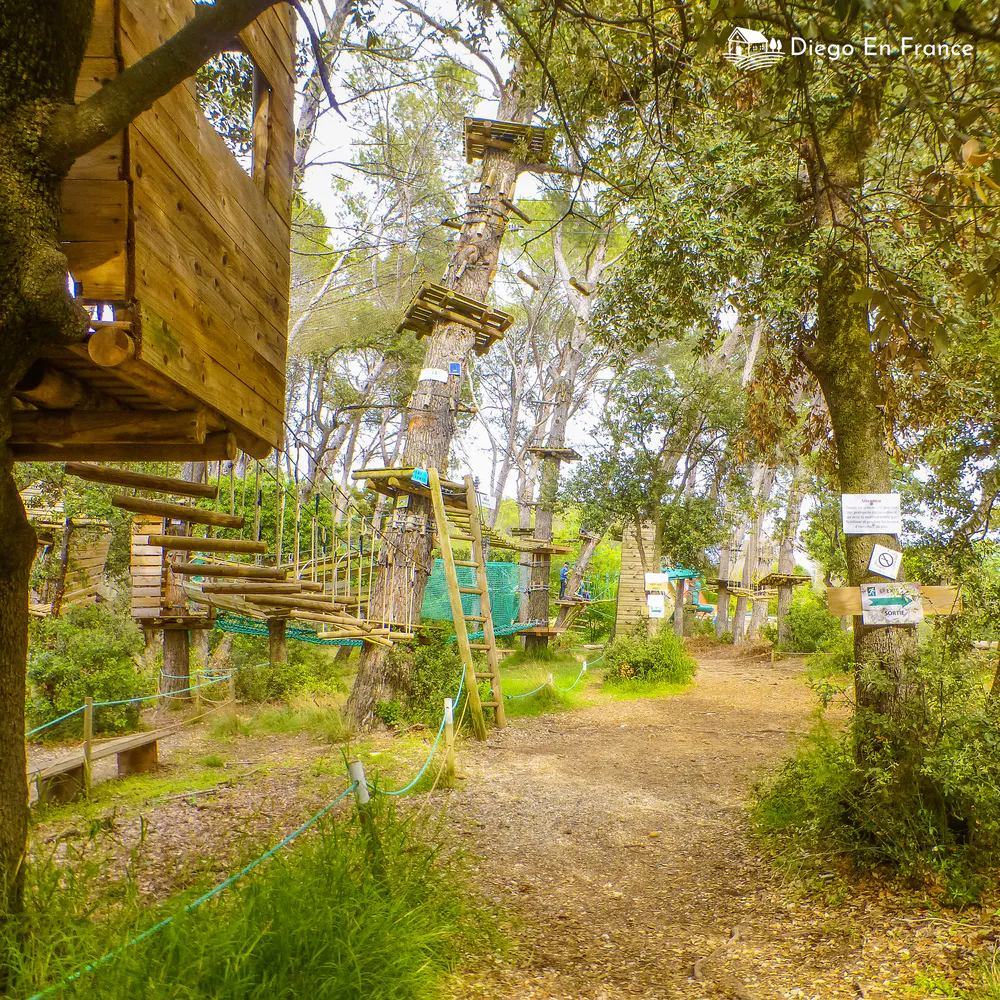
One of my favorites. These are outdoor parks with courses suspended between trees, zip lines, hanging bridges, rope ladders… All in the heart of nature. They are 100% safe and adapted by age and skill level.
Perfect for a morning of adventure and a picnic lunch in the forest.
👉 In France you have more than 500 Accrobranche Parks to choose from. So you are sure to always find one nearby.
Dinosaur and prehistory parks
France is full of spaces dedicated to paleontology and the Jurassic world. Some of the best:
- Dinopedia (Cévennes): open-air museum with life-size dinosaurs.
- Musée des Dinosaures (Mèze): walk among giant replicas, sounds, and interactive zones.
- Dino-Zoo (Burgundy): attractions, 4D cinema, educational activities.
- Paléopolis (Auvergne): paleontology, workshops, and educational theme park.
Underground tourism: caves that leave you speechless
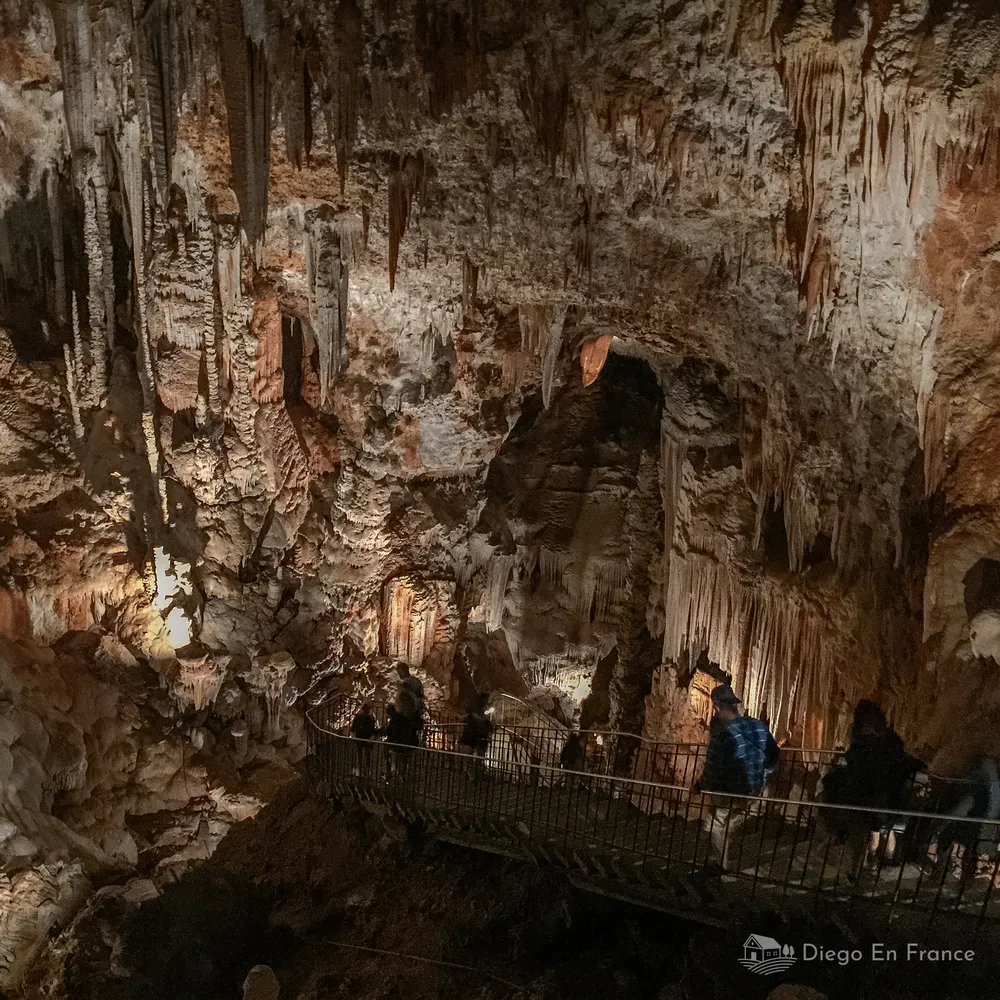
👉 France has more than 100 tourist caves adapted for visits.
With more than 6 million visits per year, France is the most developed market in Europe in this sector.
Some are true underground cathedrals: with giant stalactites, underground lakes, light displays, and other wonders.
Places where nature reveals its power and mystery. In these sites, what strikes you is the visual and sensory spectacle.
I’ll name a couple to give you an idea, but wherever you go, check the surroundings — you’ll surely find one nearby to visit.
- The Clamouse Cave (Hérault): unique stalactites and a spectacular light show that highlights the natural formations.
- Canalettes Caves (Pyrénées-Orientales): grand chambers, limestone columns, and a light and sound show in a magical setting.
Prehistoric caves: art and traces of the first humans
In caves linked to prehistoric remains, the value is not only natural but also historical and cultural.
These are places that preserve, or precisely reproduce, the art of our ancestors: cave paintings, engravings, traces of the first humans who inhabited Europe.
These visits combine the thrill of exploration with enormous educational value.
Some outstanding examples:
- Chauvet Cave (Ardèche): declared a UNESCO World Heritage Site. Its paintings are over 36,000 years old and represent one of the oldest testimonies of human art.
- Lascaux II and IV (Dordogne): exact replicas of the original cave, designed to protect the fragile paintings while allowing the public to discover this exceptional heritage.
A unique, educational, and magical experience. And yes, many of them also have museums, restaurants, picnic areas, and lots of activities for kids.
In both types of caves, what stands out is the care for the visitor experience: modern museums, picnic areas, activities for children, well-marked trails. Everything is prepared so that the visit is complete and family-friendly.
Parks with unusual (and awesome!) themes
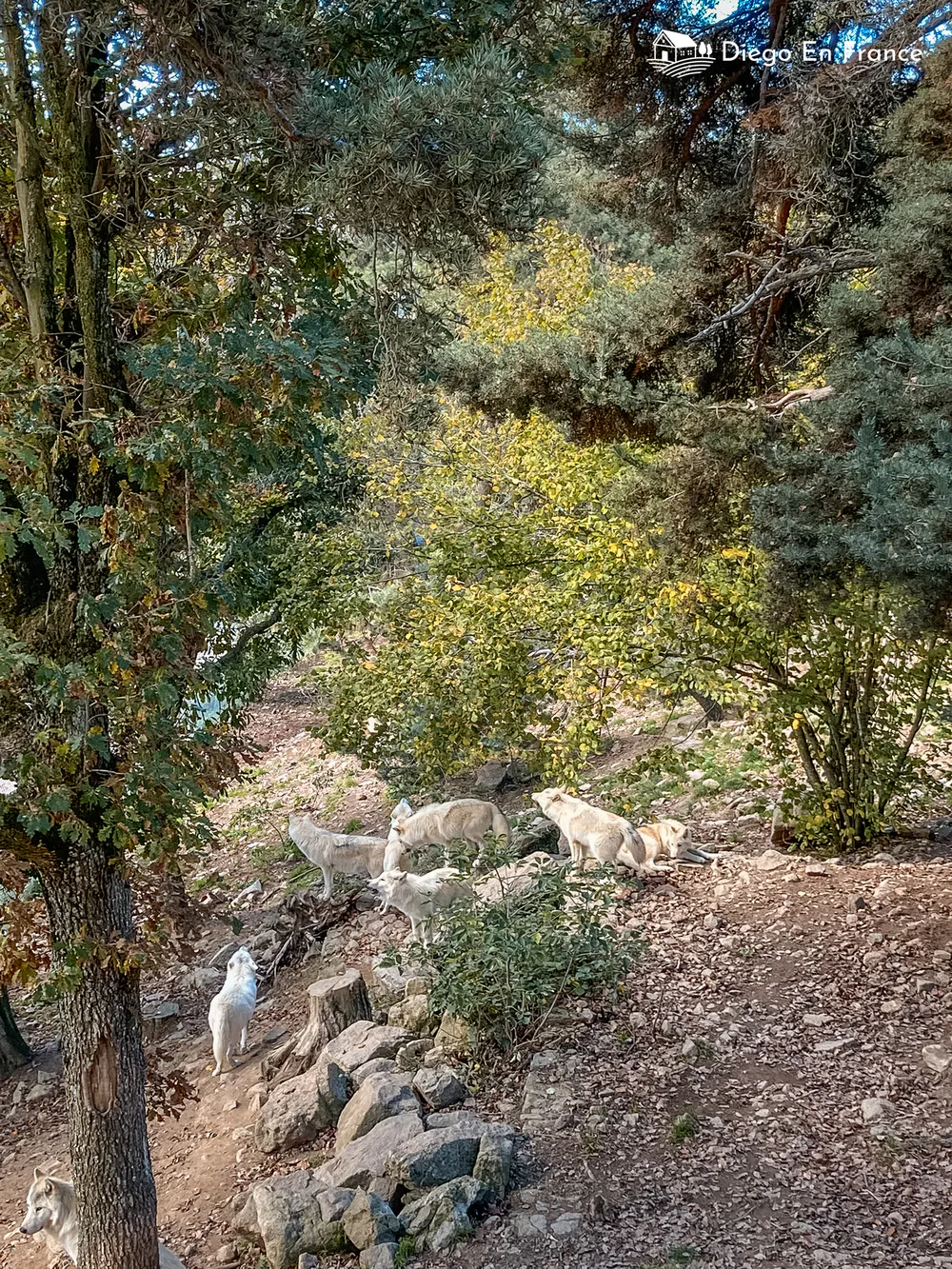
France also surprises with parks dedicated to super original themes that make each visit unique:
- Micropolis (Aveyron): an entire park dedicated to insects — fascinating and educational!
- La Forêt des Singes (Rocamadour): where you walk among free-roaming monkeys.
- Parc des Loups du Gévaudan (Lozère): dedicated to wolves, with ties to an ancient local legend.
And the best part is that many of these parks are close to charming villages, so you can combine nature, culture, and sightseeing in a single visit.
⭐ There are plenty of great spots to grab a bite during your outings. If you’re traveling with family in France, don’t miss this guide to ideal snacks and meals for the journey.
👉 The Best Snacks and Meals for Kids to Discover France on a Family Trip
Because in France you will enjoy charming villages
✅ At diegoenfrance.com I specialize in discovering, exploring, and reviewing all those charming villages in France.
If there’s something that truly captures your heart when you travel through France, it’s the charming villages you stumble upon without even looking for them.
Those places that seem straight out of a fairy tale, where time moves more slowly, where the houses preserve centuries of history, and every corner is full of details.
And the best part: many of them aren’t in the tourist guides or the classic itineraries. They’re authentic, vibrant, and deeply French.
Les Plus Beaux Villages de France (and many more)
👉 In France, there are more than 180 villages classified as the most beautiful according to the Association Les Plus Beaux Villages de France.
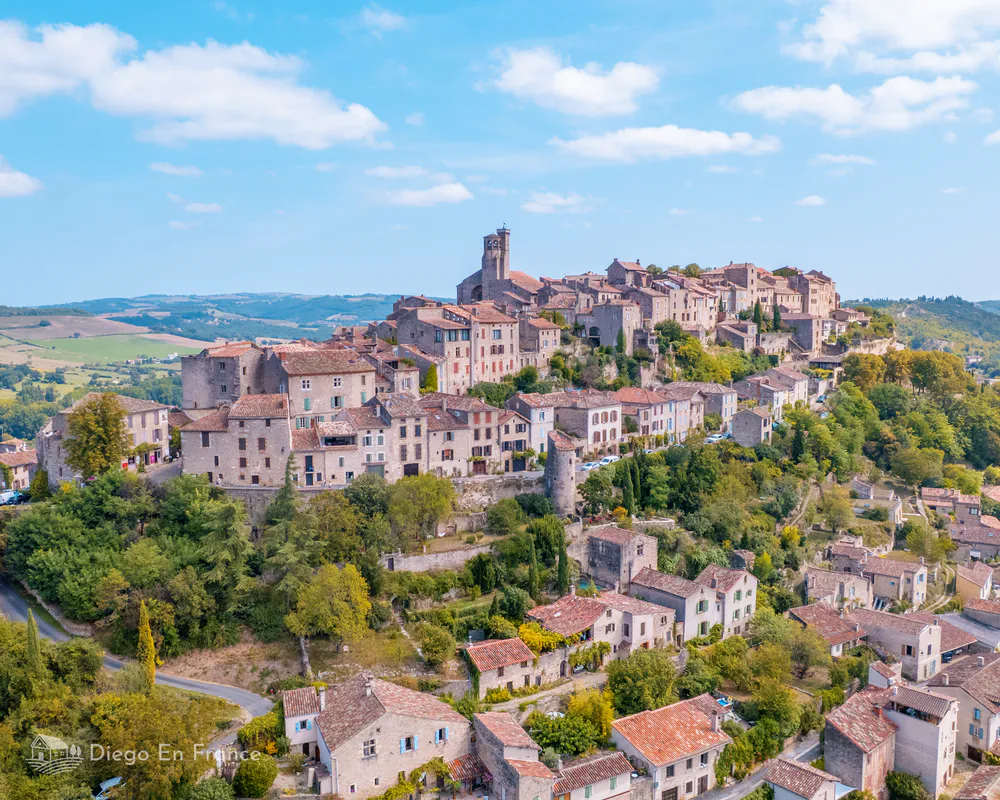
This association has existed since 1982 and officially designates “The most beautiful villages of France.” To be part of this list, they must meet strict requirements for architectural preservation, history, and charm.
But there are also many others that aren’t on that list and are just as wonderful — genuine, peaceful, lovingly cared for by their own residents.
💙 Why visit France: for its charming villages. Because each village is a journey into the heart of French authenticity, with history, the good life, and beauty in every corner.
Architecture with soul
One of the things that has impressed me most since I started exploring France is the aesthetic care of the villages.
The stone houses, the pitched roofs, the harmonious colors, the wooden shutters, the flowers on the balconies, the fountains in the squares…
And what’s magical is that you can see villages that are impeccably restored and others that still bear the marks of time, with weathered walls that tell stories.
And that too has a unique charm — rawer, more authentic.
Village life, real life
In the villages, life unfolds in the square, at the market, at the café. Here people play pétanque in the shade of the plane trees, chat with neighbors, and enjoy an apéritif on a terrace.
And speaking of shade… those tall, generous trees that fill the squares and paths are the “platanes,” a symbol of the south of France that offers shelter from the sun and gives each scene its unmistakable charm.
Local markets: the true social events
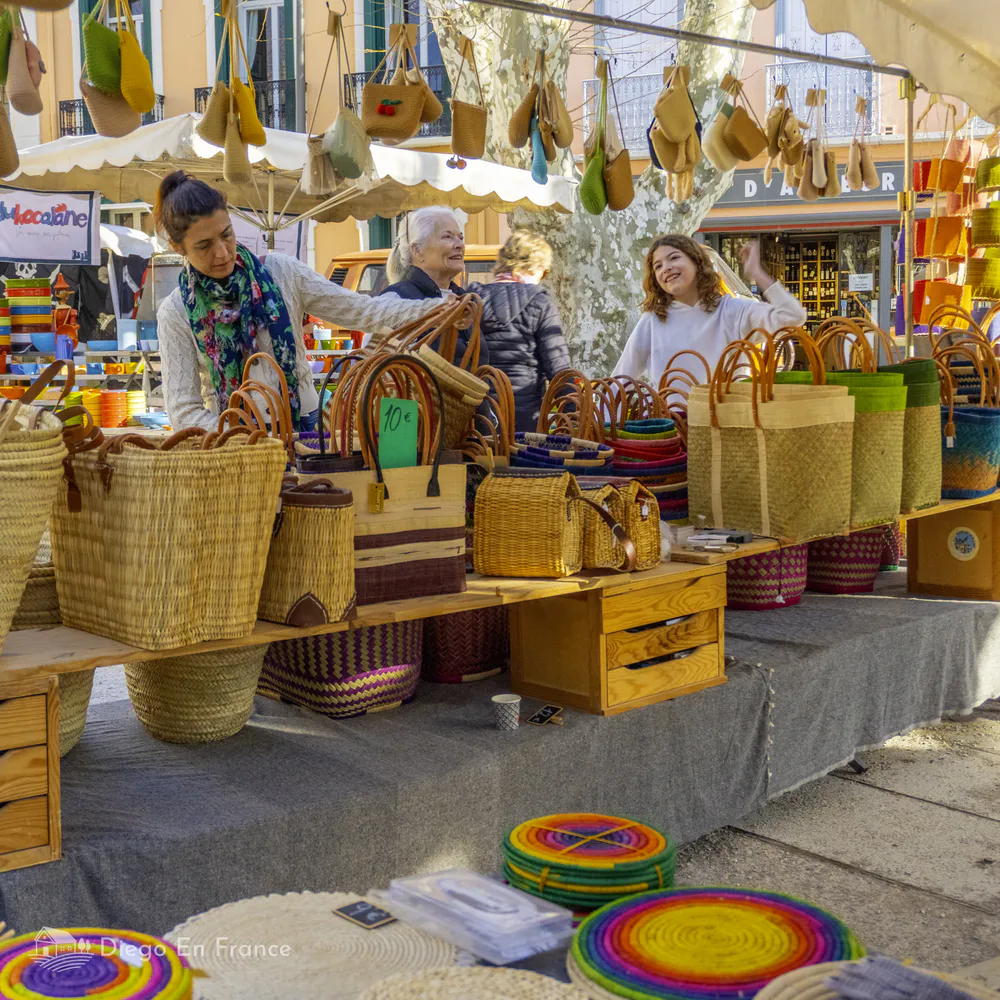
If you want to feel the soul of a French village, go to its market. There you’ll not only find the best cheeses, cured meats, breads, and wines of the region.
You’ll see how people greet each other, chat, recommend products, and meet up with neighbors.
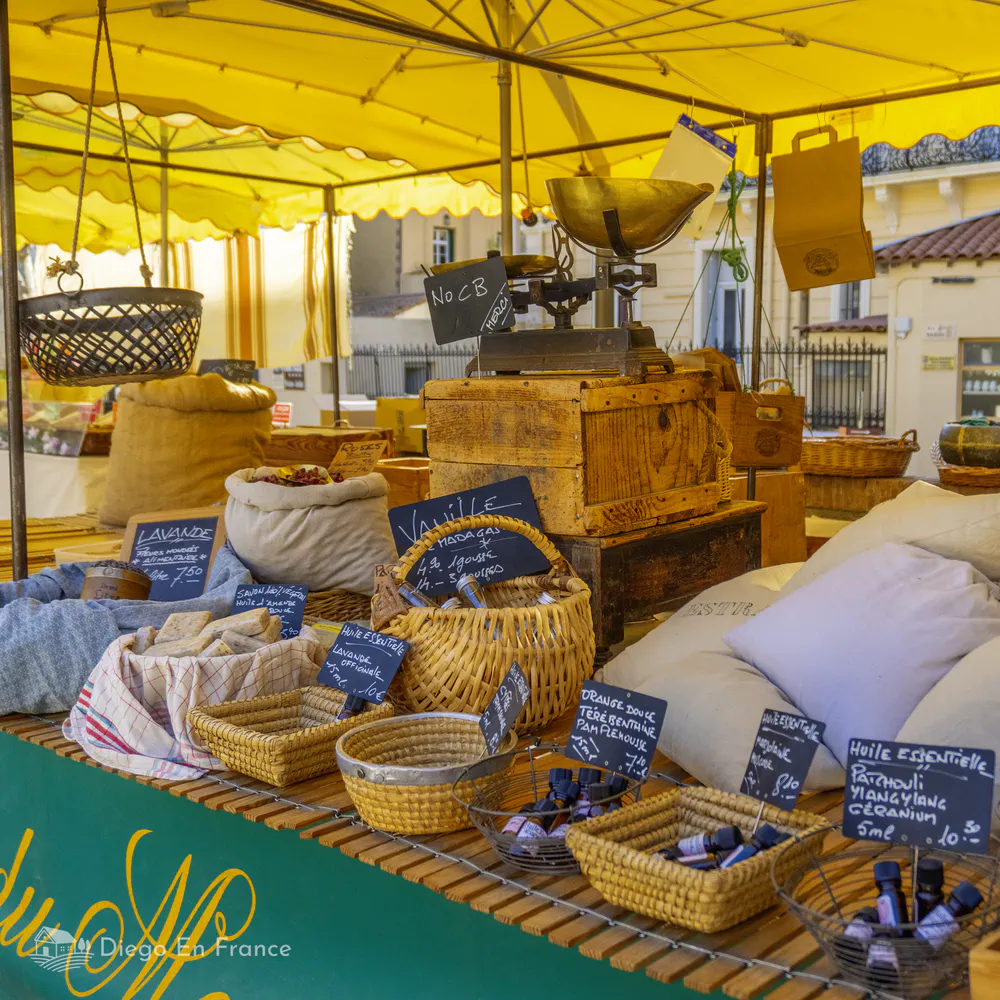
It’s an explosion of aromas, colors, and textures. And you’ll also find stalls with crafts, soaps, lavender, ceramics, and home decor.
Always with that French touch that blends simplicity, elegance, and authenticity.
Because in France history lives on: Castles, heritage, and history
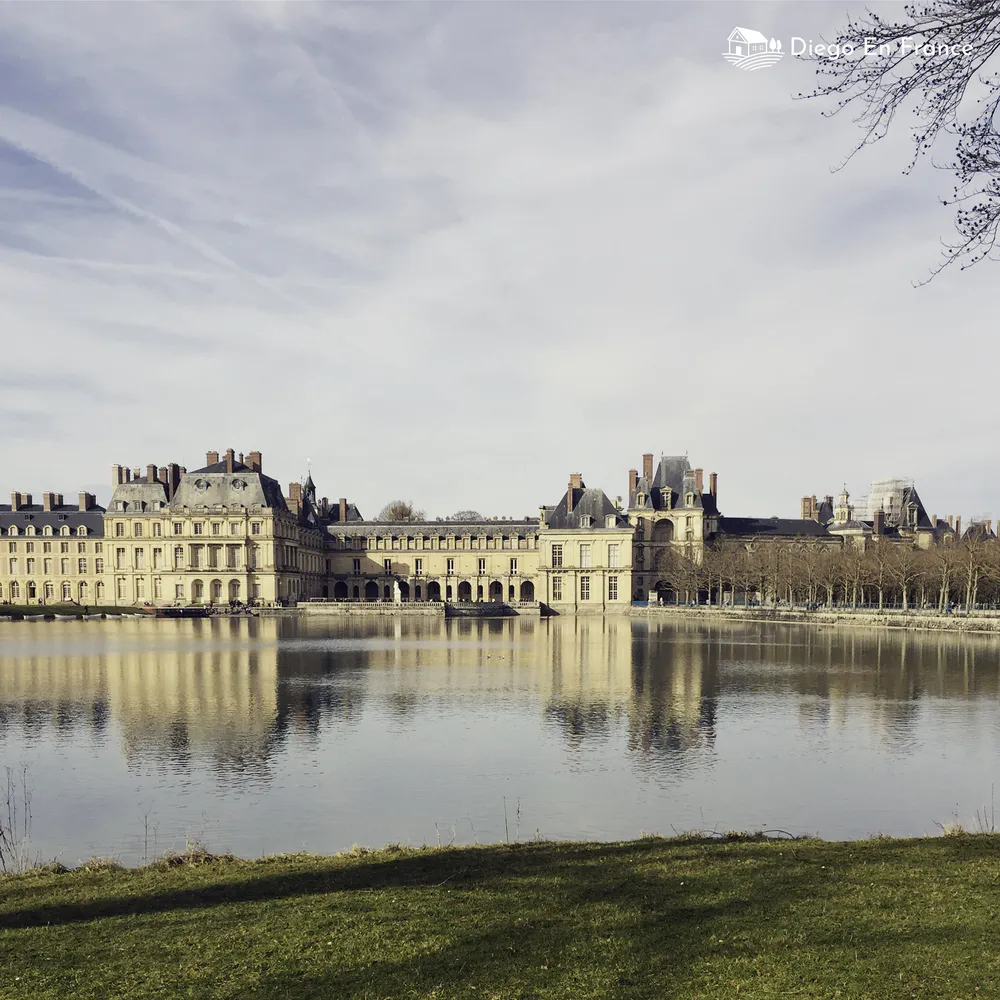
France is synonymous with history. And nothing represents it better than the castles that you will always see in cities, villages and scattered throughout the country.
From medieval fortresses to Renaissance residences, romantic ruins to impressive palaces.
They’re everywhere. In villages, in the mountains, along rivers, in the middle of vineyards.
👉 In France, more than 40,000 castles are officially listed
Castles you can visit in France
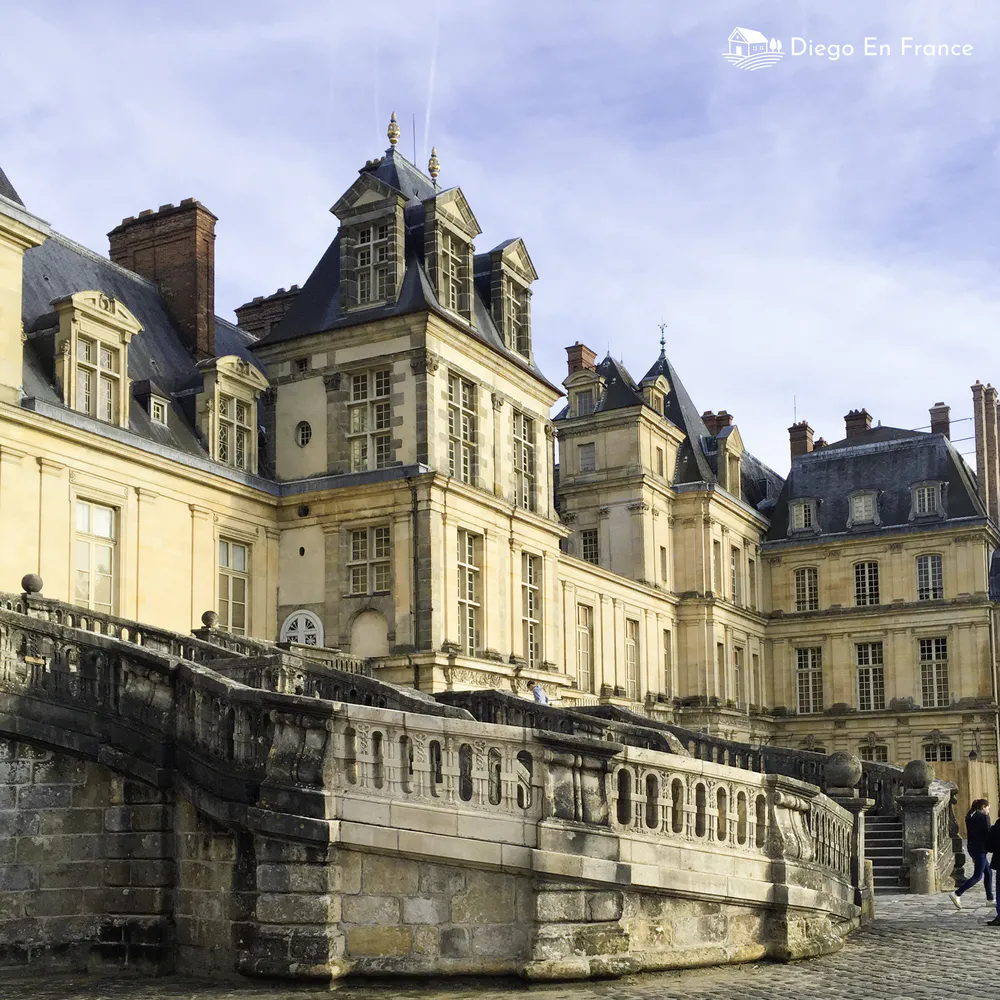
There are very famous castles, like Versailles with its overwhelming luxury, or Fontainebleau, Napoleon’s favorite. Others are grouped into routes, like the castles of the Loire Valley, where each one seems more beautiful than the last.
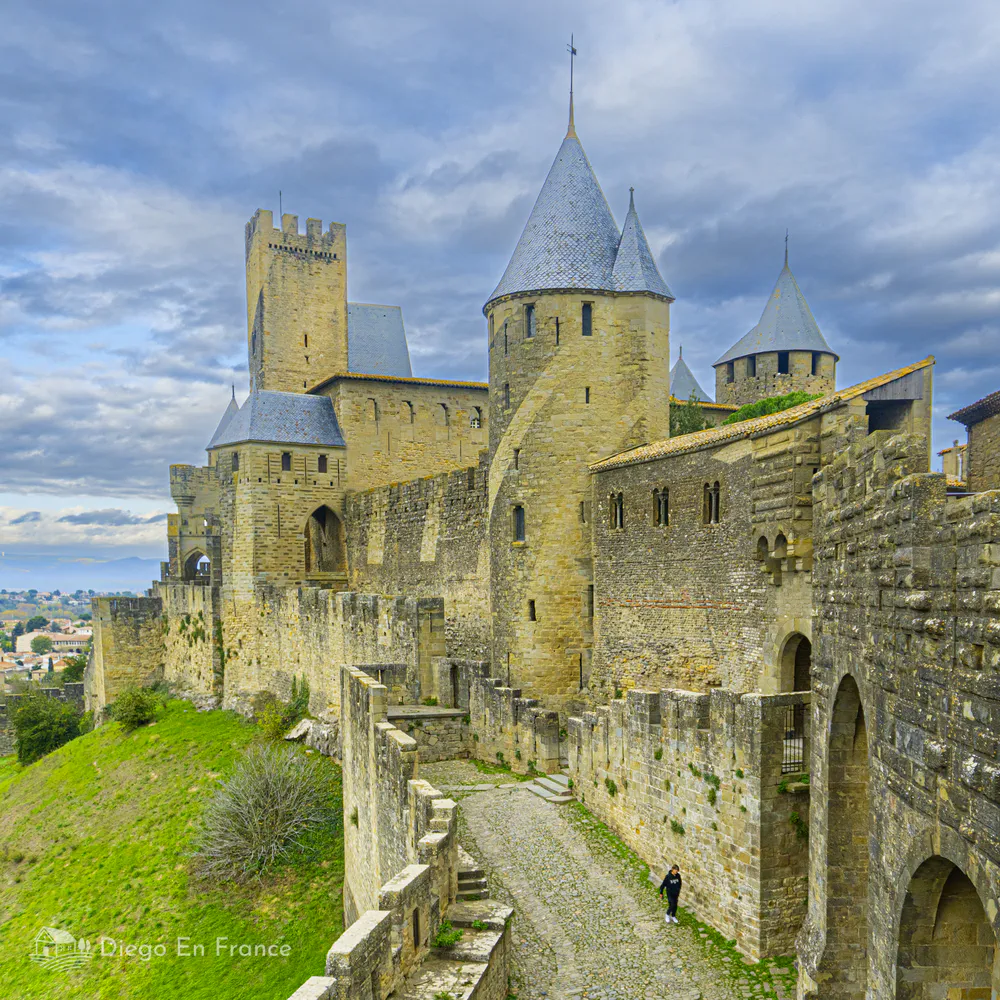
And there are also lesser-known gems, just as magical, like the castles of Périgord, surrounded by forests, or those in the south of France, combining defensive architecture with cinematic landscapes.
Living experiences in the castles of France
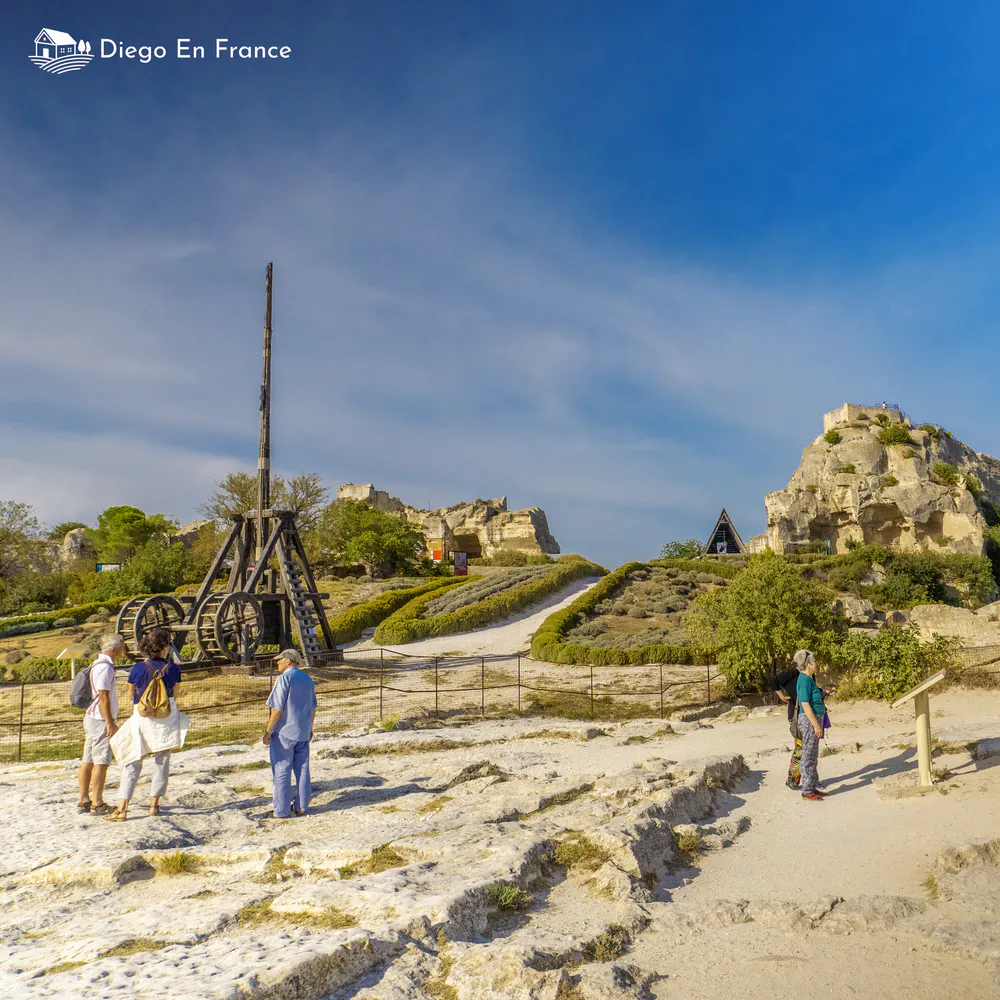
The best part is that many castles aren’t just for looking at. There are theatrical tours, medieval jousting shows, sword demonstrations, workshops for kids, even real working catapults.
Everything is designed so that both kids and adults can connect with history through play and learning.
And in some, you can even have lunch in their gardens, attend concerts, or tour vineyards.
Sleeping in a castle in France
Yes, you read that right. In France, you can rent rooms in castles or manor houses. Some operate as chambres d’hôtes, others as boutique hotels.
And sleeping there, among antique furniture, stone walls, and coats of arms, is a unique experience that makes your stay unforgettable.
💙 Why visit France: for its castles and living heritage. Because sleeping, strolling, or dreaming within ancient walls turns your trip into an unforgettable experience.
⭐ Looking for the best places to explore in France beyond the typical routes? Here I share those hidden corners that make all the difference and that I know firsthand.
👉 Read my guide to unique destinations off the beaten path
Because in France sleeping is part of the journey: Accommodations with French soul
In France, accommodation isn’t just a place to spend the night. It’s part of the experience.
It’s a way to live the journey from within, connecting with the surroundings, with history, and with people.
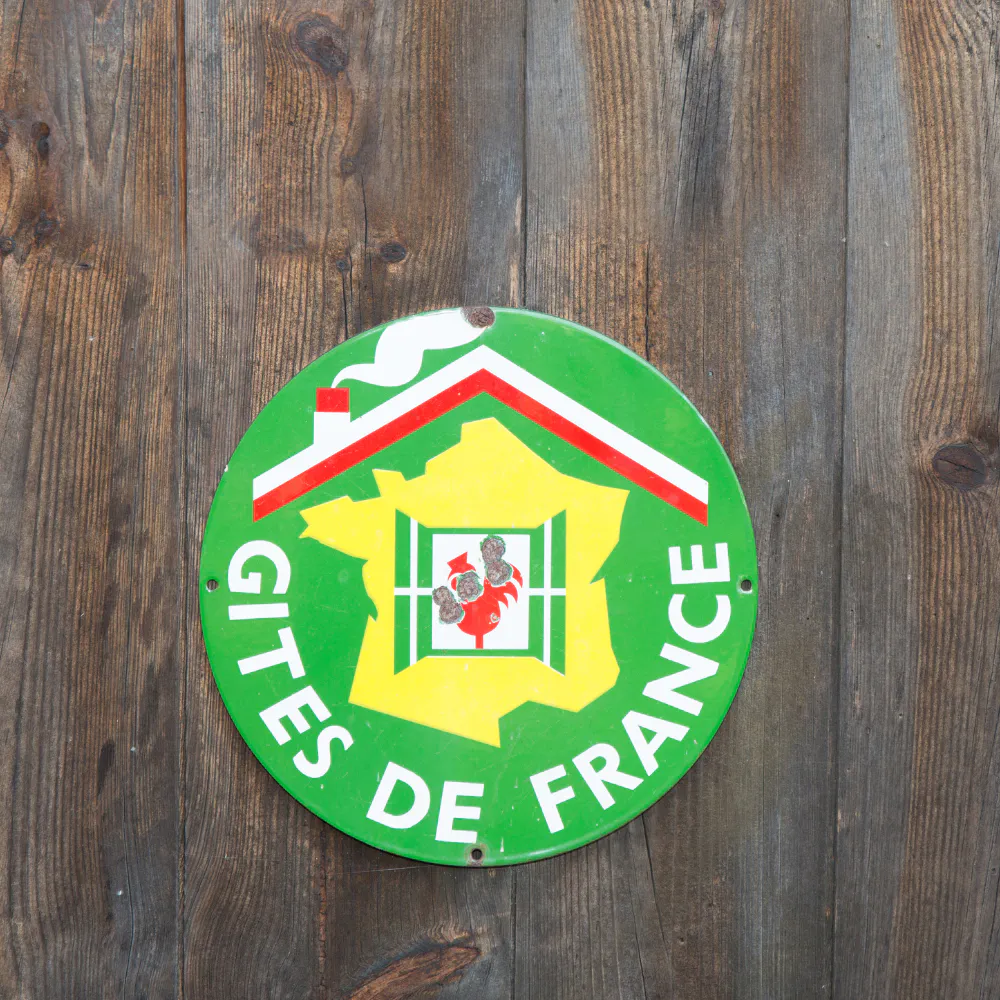
Of course, there are hotels of all categories, from international chains to boutique hotels full of charm.
But what makes France special is the variety of accommodations with their own identity, designed to make you truly feel part of the place.
Gîtes: rural houses to travel at your own pace
A gîte is a fully equipped house that you rent for a few days or a week. They’re designed for families or groups who want to do things their own way, cook at home, have outdoor space, and enjoy the surroundings with total freedom.
They’re usually in rural areas or small villages, and many have gardens, a pool, a barbecue, and play areas for kids. It’s an ideal option if you want to enjoy the peace of the countryside without giving up comfort.
Chambres d’hôtes: the warmth of a French home
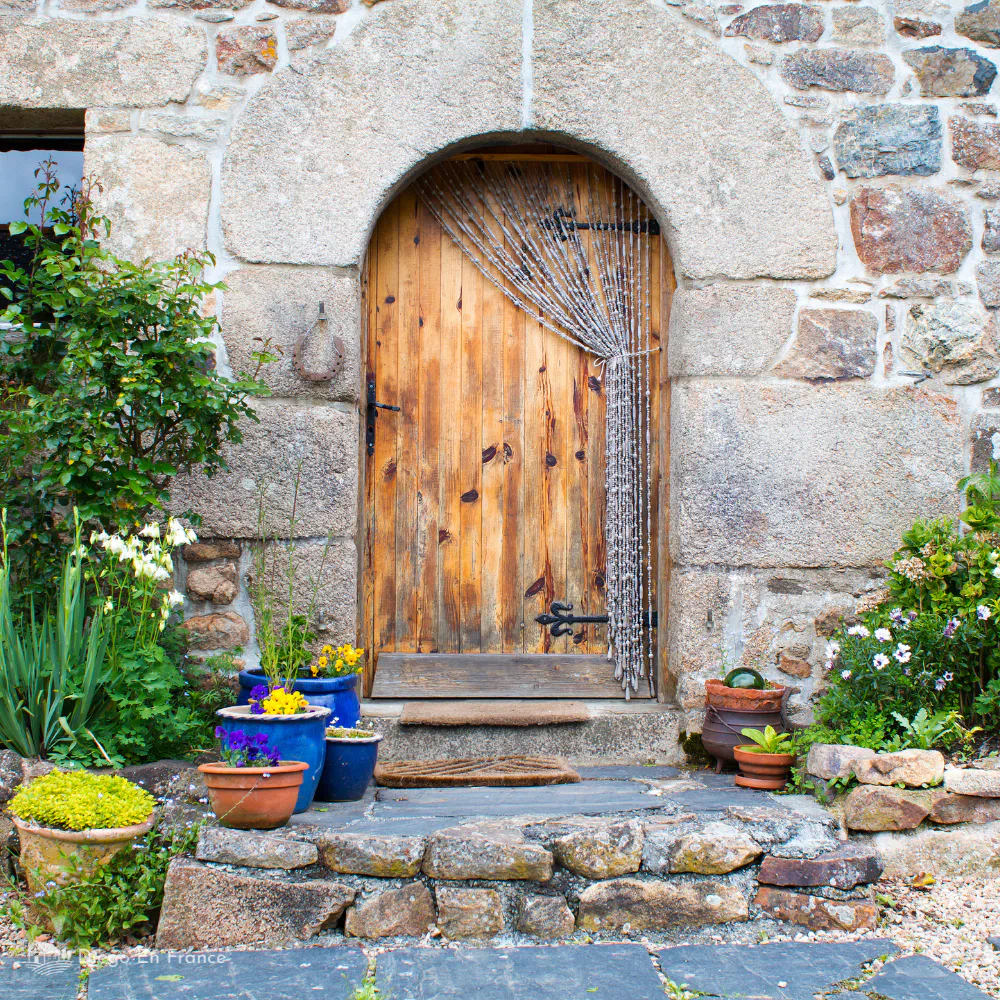
A chambre d’hôtes is a room within a private home, with a private bathroom and breakfast included.
Many times the owners welcome you personally, cook for you, tell you the history of the house, and recommend places to visit.
And they do it with a warmth that turns your stay into a beautiful memory.
What’s more, many of these accommodations are decorated with exquisite taste — antique furniture, floral details, vintage tableware.
You feel like you’re on a movie set.
Did you know that, since 1955, there has been an official network in France called Gîtes de France®, which certifies authentic rural accommodations: houses, cottages and rooms that offer quality, hospitality and a real connection with the environment.
Ideal for those looking to experience tourism in France from the inside, with the warmth of local hosts.
👉 In France, there are 58100 accommodations certified by the Gîtes de France® Network.
Hotels: comfort and professional service
France was a pioneer in the star rating system, and it shows.
Hotels in France, even the more modest ones, usually offer remarkable service quality.
Many are housed in historic buildings with their own charm, while others provide modern facilities with all the amenities.
In larger towns or cities, you’ll find everything from family-run hotels to luxury options — always with choices suited to every type of traveler.
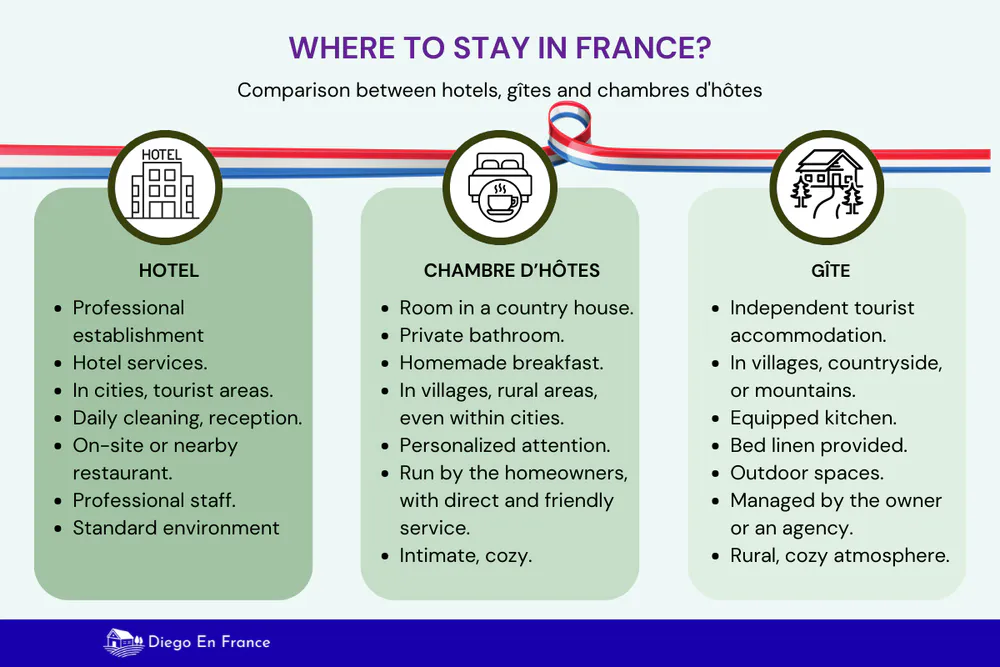
💙 Why visit France: for its characterful accommodations. Because in France, where you stay is part of the journey — rural houses, chambres d’hôtes, historic hotels… experiences that leave a lasting impression.
Because in France heritage is alive at every turn: UNESCO sites in France
France doesn’t just enchant with its lifestyle, food, and landscapes.
It’s also one of the countries with the most UNESCO World Heritage sites.
In every region, you’ll find places that hold a vital part of human history, European culture, and universal art.
👉 In 2025, France has more than 50 sites on the UNESCO list, including cultural, natural, and mixed properties.
Many of them are open to the public, well signposted, and adapted for family visits.
And what I love most is that it’s not just about isolated monuments. These are living places, woven into the daily fabric of towns and cities, where you can stroll, learn, and let yourself be amazed.
Examples to experience firsthand
Pont du Gard: the tallest Roman aqueduct you can visit in France
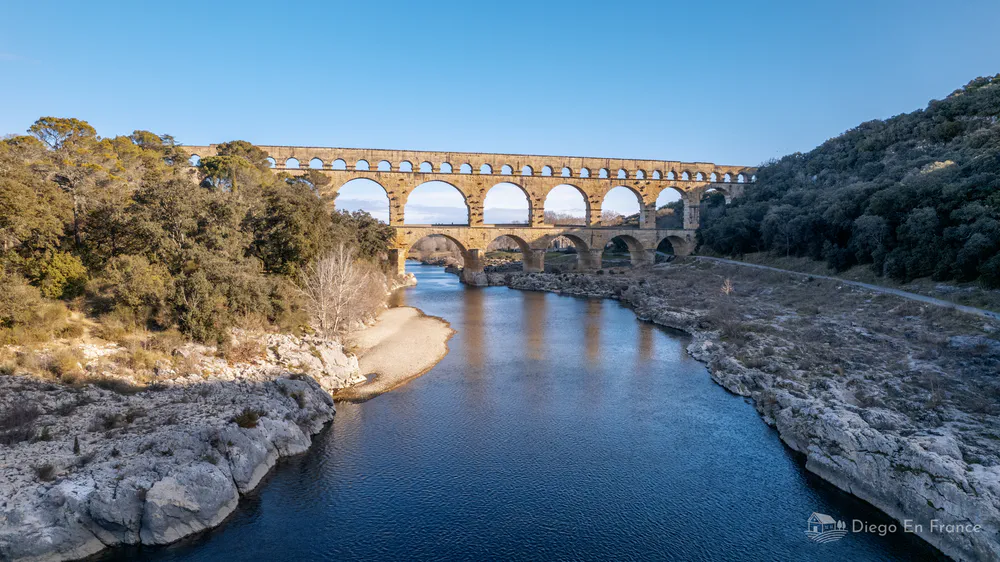
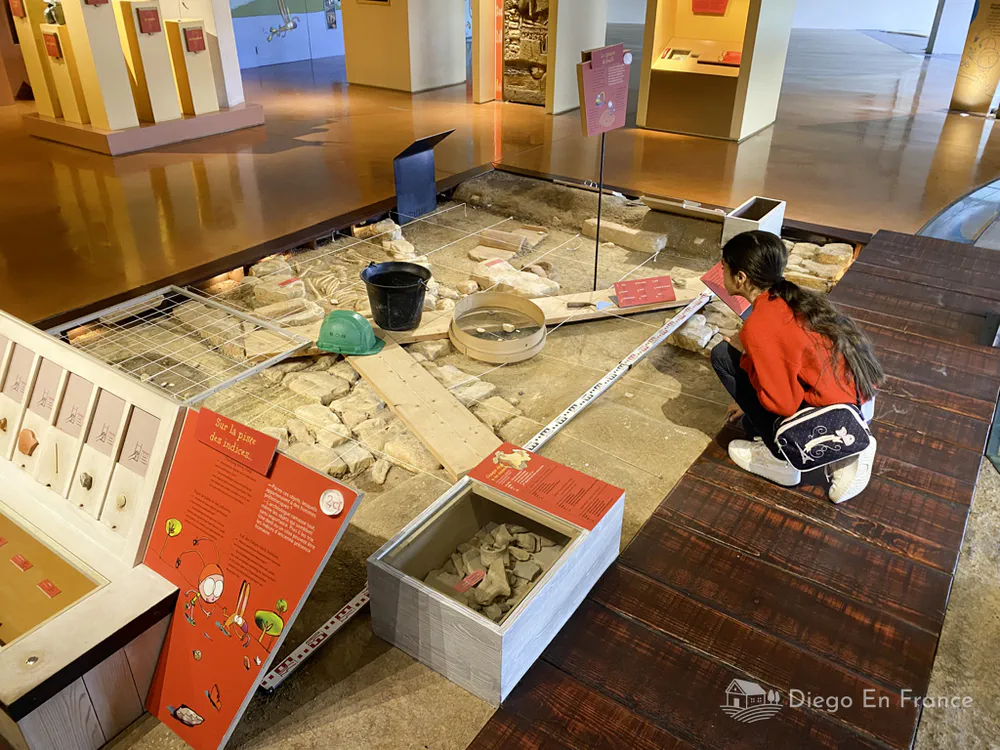
One of my favorites is the Pont du Gard, a 1st-century Roman aqueduct that spans the Gardon River.
It’s the tallest standing aqueduct built by the Romans and the only one with three levels that is still preserved.
We often go there with my family to spend the day: to swim in the river, walk along the trails, visit the interactive museum, and even kayak under the bridge.
ℹ️ The height of the Pont du Gard is 48.77 m.
Maison Carrée in Nîmes: the best-preserved Roman temple in France
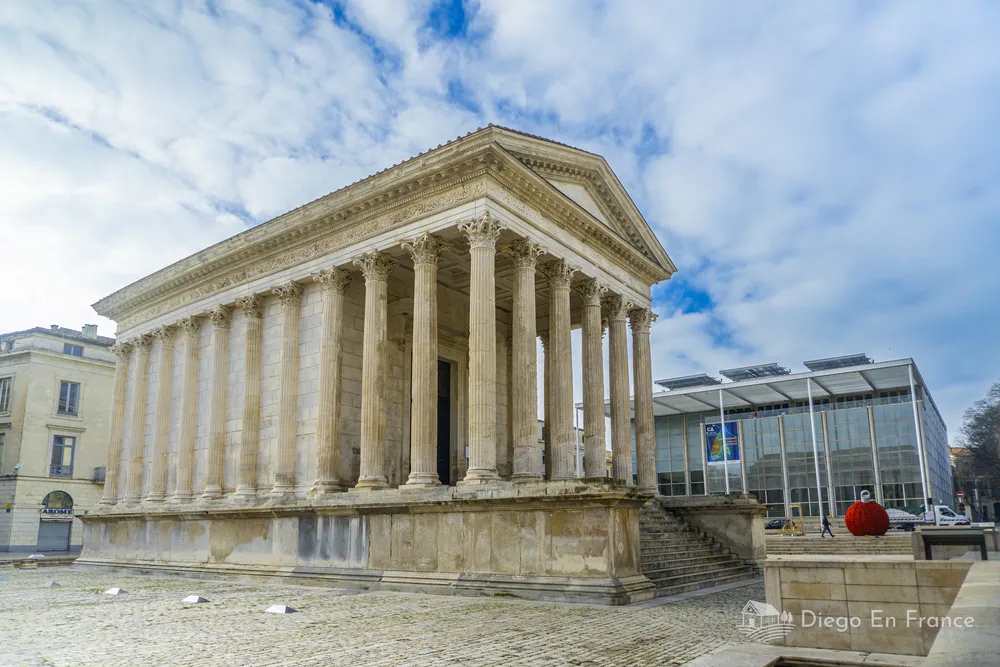
Another impressive site is the Maison Carrée in Nîmes. A perfectly preserved Roman temple that’s part of the heart of the city.
Right across from it, in total contrast, is the Carré d’Art, a modern building that creates a dialogue between the ancient and the contemporary.
The Maison Carrée is today part of the city’s identity and continues to be a center of social life.
At its feet, you’ll find markets, exhibitions, cultural events.
📍Address : Pl. de la Maison Carrée, 30000 Nîmes
You also have gems like:
- The fortified city of Carcassonne
- The Canal du Midi, with its network of locks and paths shaded by plane trees
- The historic center of Avignon with the Palais des Papes
- The incredible Mont Saint Michel and its bay
- The banks of the Seine in Paris
- The Roman heritage of Arles
And that’s not to mention that French gastronomy has also been recognized by UNESCO as Intangible Cultural Heritage of Humanity. Because here, eating well isn’t a luxury — it’s a way of life.
In each of these places, you’ll find interpretation centers, museums, shops, restaurants, and rest areas. Everything is designed so that you can learn, enjoy, and take home a piece of the world’s history.
💙 Why visit France: for its UNESCO sites. Because in every region you can discover living heritage, full of history and culture, that transforms your trip into an encounter with the best of humanity.
Because in France eating is an art of living: Exceptional gastronomy
If there’s one thing you can’t miss when you come to France, it’s the food. And I’m not just talking about delicious dishes. I’m talking about a way of life.
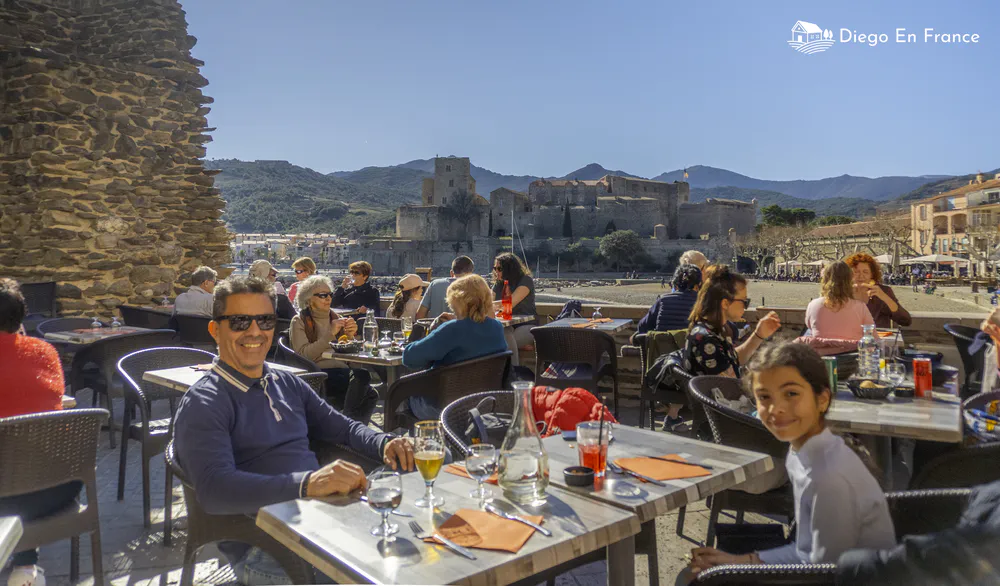
Because in France, gastronomy isn’t just an addition to the trip — it’s a central part of the experience.
For generations, good eating has been part of everyday culture. Here, meals are taken with time, with pleasure, with respect for the ingredients, and with love for the rituals.
It’s no coincidence that French gastronomy has been recognized by UNESCO as Intangible Cultural Heritage of Humanity.
Michelin  restaurants: excellence within reach of the traveler
restaurants: excellence within reach of the traveler
👉 France leads the world in the number of Michelin restaurants: 654 starred establishments
From small one-star bistros to temples of haute cuisine with three stars, each is a celebration of product, flavor, and creativity.
And the best part: there are options for every budget and style, because here gastronomic excellence is part of the culture, not just a luxury reserved for a few.
Cheese: more than a thousand reasons to indulge
👉 More than 1,200 varieties of cheeses await you in France. From the softest and creamiest to the most intense and cured. Each region has its own, and each one tells a story.
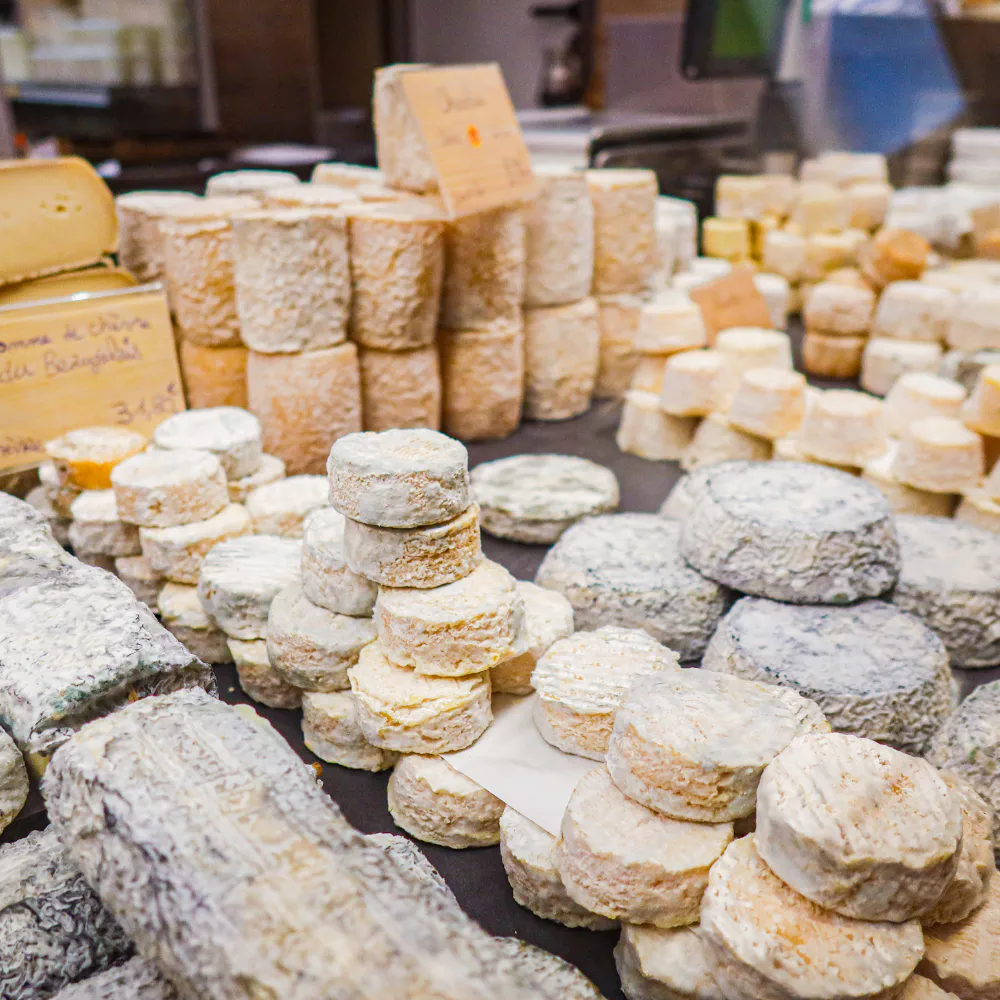
There are cheeses made on small farms, using traditional techniques, that you can buy directly from the producer. And the best part: many places offer tastings or even guided tours of the cheese dairies.
One custom I quickly adopted is eating cheese before dessert, accompanied by fresh bread and a glass of wine. You can’t imagine how easy it is to get used to that.
Wines: a land to discover in every glass
France is wine country. And not just any wine — some of the most prestigious in the world.
From the reds of Bordeaux to the whites of Alsace, the rosés of Provence, or the sparkling wines of the Loire Valley.
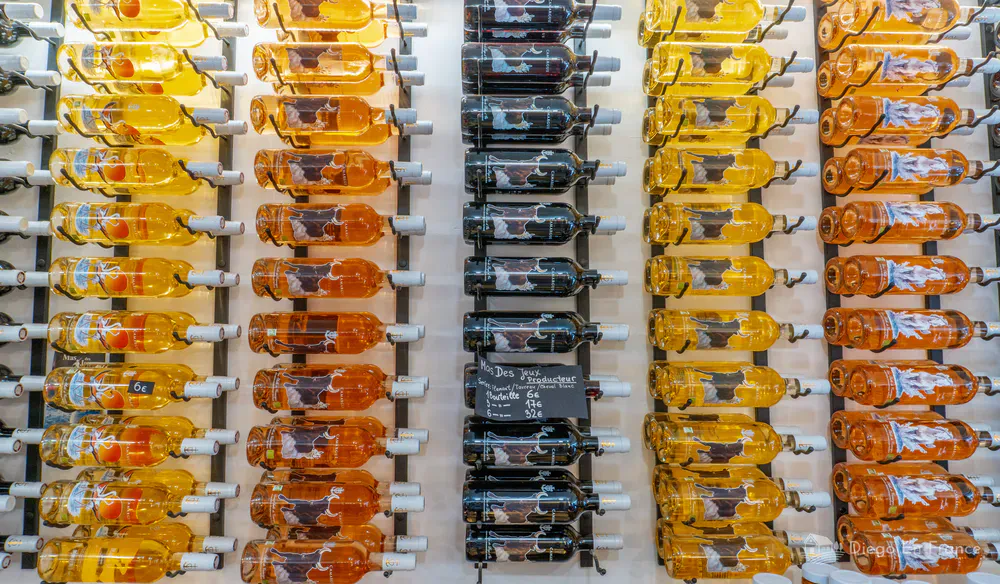
And of course, Champagne. But the real kind. Because, as you may know, only wine from that specific region can truly be called Champagne.
Another example of how in France the origin, the terroir, is protected, and the product is honored.
What I love is that in almost any village you can visit a winery, do a tasting, and talk with the winemaker. All without the need for big organized tours. Just curiosity and a desire to learn.
⭐ Gastronomy is part of the journey, and eating well with kids in France is easy if you know where and how. Discover these practical tips for enjoying meals as a family.
👉 Read my guide with the Best Tips for Families at a Restaurant in France
Eating well anywhere
One of the nicest things about traveling in France is that you can eat well and healthily everywhere. In an elegant restaurant or with the daily menu at a village bistro.
On the terrace of a small square or at a picnic by the river.
Local markets are a feast for the senses. There you can put together your lunch with cheeses, cured meats, pâtés, artisanal breads, seasonal fruits, and a good wine.
All fresh, regional, often organic or from short supply chains.
And if you stay in a gîte or a chambre d’hôtes, it’s very likely you’ll be treated to a homemade breakfast: fresh juice, warm bread, jams made by the host, artisanal yogurt.
It’s those small details that make every meal a memory.
💙 Why visit France: for its unique gastronomy
Because here, eating is an art, a ritual, and a pleasure that turns each day of your trip into a celebration of the senses.
⭐ Planning a trip to France is much easier when you know how to get around: roads, tolls, rules, and those little tips only an experienced traveler can give you.
👉 Get ready with my guide on how to Drive in France as a tourist: Tips from an experienced traveler
Sustainable and decentralized tourism: traveling without crowds
One of France’s great strengths as a tourist destination is its decentralized and sustainable model. It’s not a country that concentrates its offerings in just three or four places.
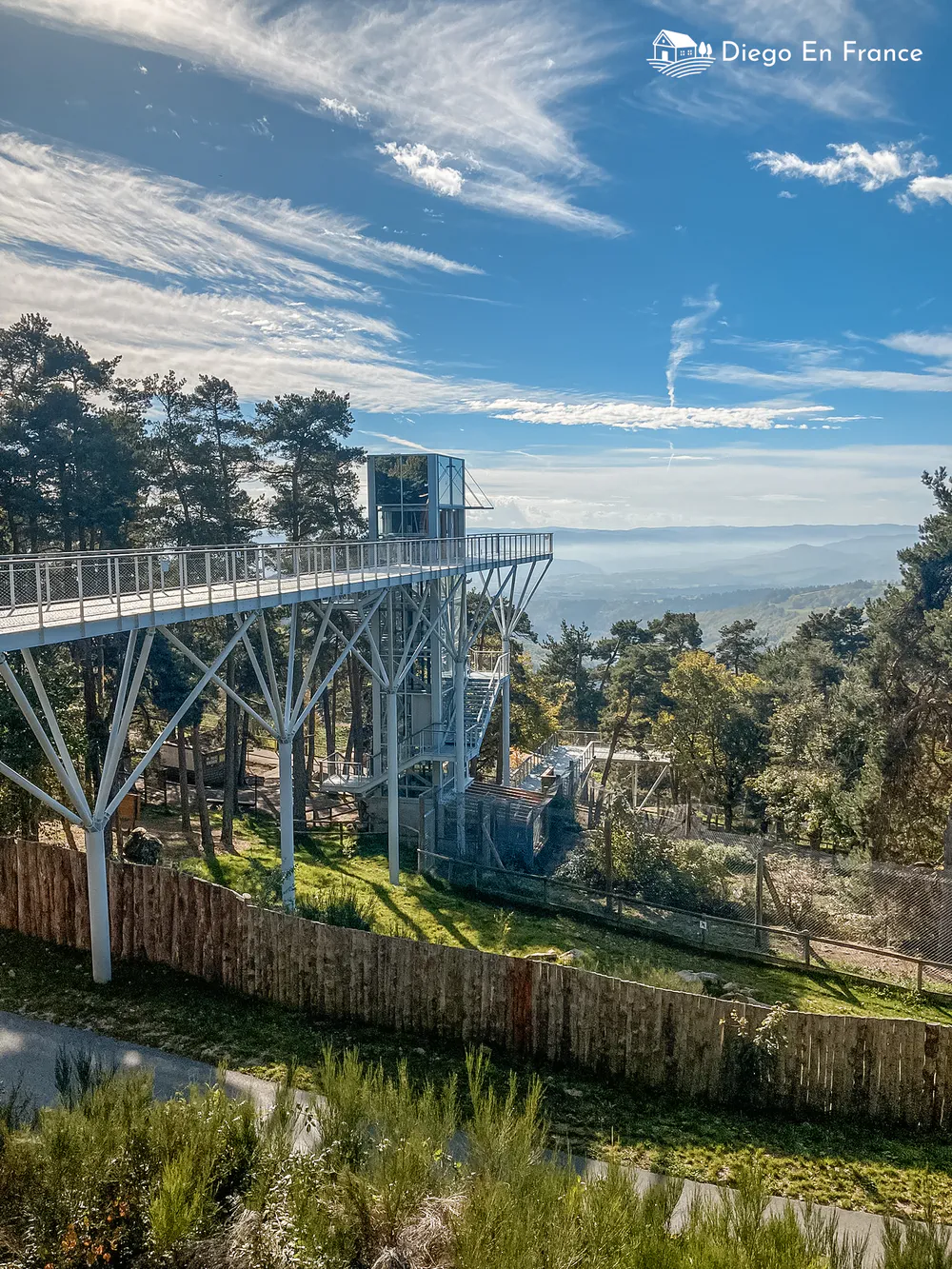
Quite the opposite: here tourism is encouraged across the entire country, in all seasons, with options that suit all tastes and travel styles.
For decades, the French government has promoted public policies to:
- Avoid tourist saturation in large cities or iconic sites.
- Distribute the flow of travelers throughout the country.
- Encourage the development of tourist activities and services in rural or lesser-known areas.
This translates into a very real experience: you can travel in the middle of summer or during school holidays and still find peaceful villages, spacious sites, available accommodations, and authentic experiences far from mass tourism.
A school calendar designed for tourism too
France has a school system that divides the country into three zones, with staggered holidays every six weeks.
What does this mean? That at no time is the entire country empty, nor is it full all at once. This helps avoid peaks in visitor numbers, distribute demand, and maintain a good quality of life for both locals and visitors.
A high-quality offering across the country
Thanks to this vision, today you can go to a remote village in the countryside and find:
- An open, well-equipped tourist office.
- Quality accommodations, from gîtes to chambres d’hôtes or small hotels.
- Cultural activities, marked trails, recreational parks, markets, guided tours.
This model makes traveling in France not only more pleasant but also fairer, more balanced, and more respectful of the environment.
💙 Why visit France: for its sustainable and decentralized tourism
Because you can discover authentic places, far from the crowds, and travel with calm, respect, and quality throughout the country.
The figures that explain why France is a unique destination
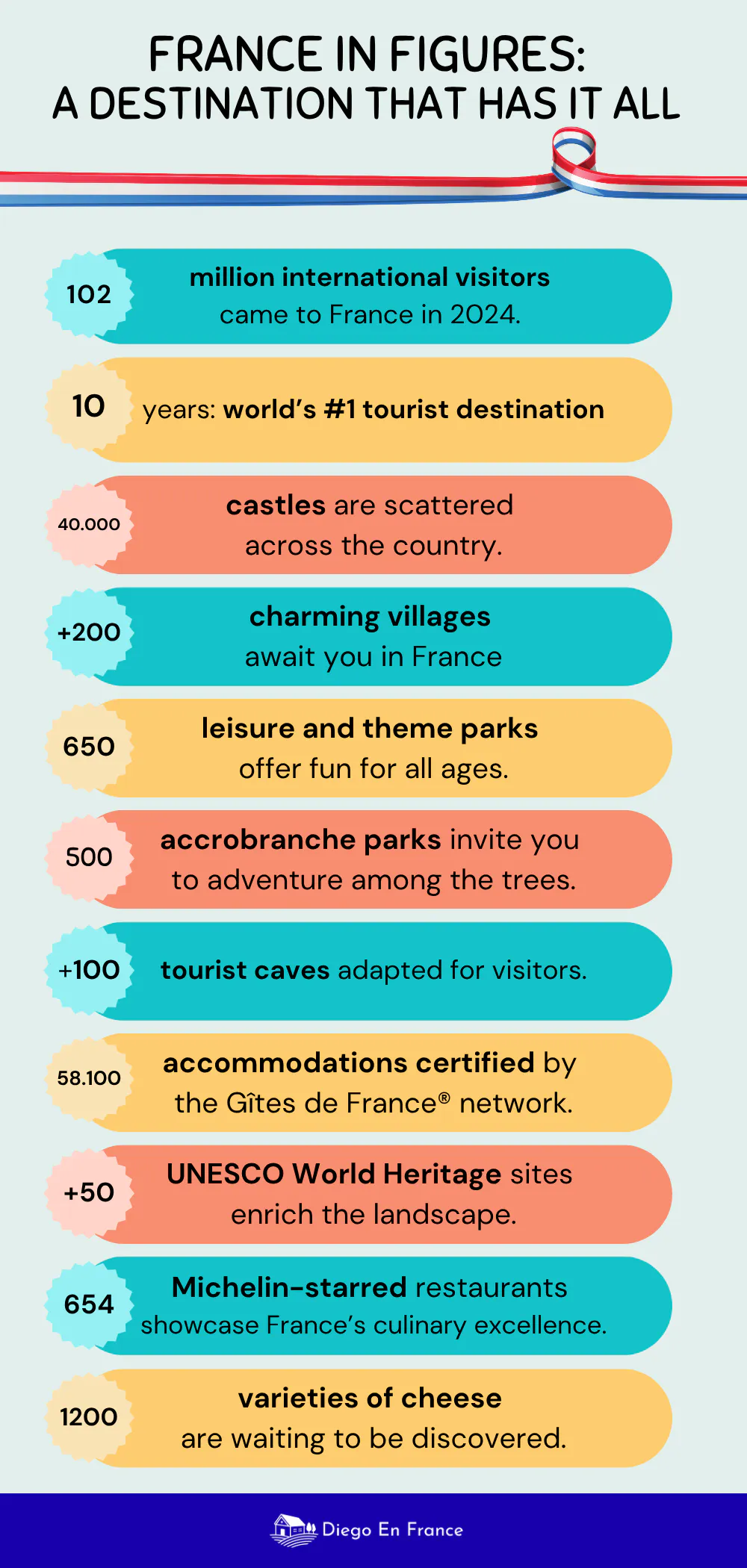
Interactive map of what to see in France
So you can plan your trip more easily, I’ve prepared this interactive map with all the destinations, villages, castles, caves, parks, and UNESCO sites mentioned in the article.
Explore it, zoom in, create your own route, and discover the best of France — just as I experience it on every outing with my family.
Where do you want to go?
Pick your perfect charming village
Frequently asked questions about tourism in France
Why is visiting France a good idea for a family trip?
Because traveling to France with family means variety and comfort. The country is full of destinations designed for both adults and kids: castles with interactive activities, leisure parks, educational museums, safe trails, vibrant markets, and family-friendly accommodations. All backed by excellent infrastructure that makes tourism in France easy and enjoyable for those traveling with children.
Is France an expensive country to visit?
France can suit many budgets. It’s true that some destinations, like Paris, are more expensive. But tourism in France offers plenty of affordable options: charming villages, free nature parks, local markets, rural accommodations, and restaurants with budget-friendly daily menus. With good planning, it’s possible to enjoy the country without overspending.
What is the best time to visit France?
It depends on what you’re looking for. Spring and autumn are ideal for planning a trip to France if you want to avoid crowds and enjoy pleasant weather. Summer is perfect for outdoor activities and family tourism, although there are more visitors. Winter is magical if you’re drawn to snow and traditional festivals. France has something to offer all year round.
What type of accommodation should I choose when planning a trip to France?
When planning a trip to France, you can opt for accommodations that are part of the experience: gîtes (rural houses), chambres d’hôtes (bed & breakfasts with personal attention), historic or modern hotels, and even castles where spending the night is a dream come true. The key is to choose according to your style and the kind of tourism you want to experience in France.
How to get around France if I’m planning a trip on my own?
Getting around France is very easy. You can combine high-speed trains (TGV), bus networks, car rentals, or even bike routes in many regions. If you’re planning a trip to France on your own, it’s ideal to think of a mix depending on the destination: car for villages, train to connect major cities, and local transport to explore.
Tourism in France is lived with all the senses
France is not just a place to visit. It’s a country to feel, to taste, to explore, and to experience at a slower pace.
Here, landscapes aren’t just seen: they are smelled, touched, and breathed in. History isn’t locked away in museums: it’s walked through, crossed, heard in the stones.
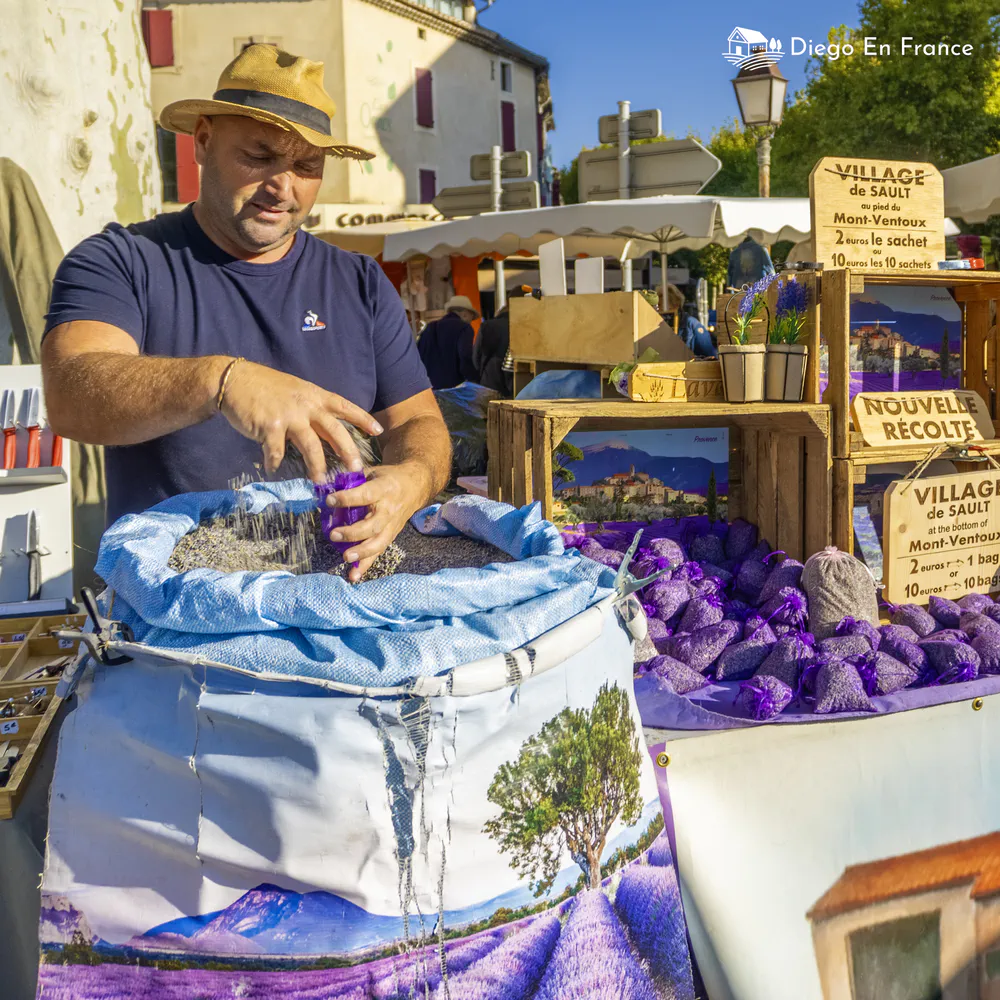
Food isn’t just a pause between activities: it’s a ceremony, a shared pleasure, a way to connect with the land and with people.
France is its great cities, of course. Paris, with its unmistakable light and cultural legacy, is a natural gateway.
But it’s also the rural roads, the hidden villages, the open-air markets, the unexpected experiences that appear when you step off the classic route.
You can rest, explore, learn, play, be surprised, be moved.
You can live experiences that stay with you forever — and that your children will remember when they grow up.
And you can do it without stress, without big crowds, without rushing from one place to another. At your own pace, just the way you like it.
Because here, every detail matters. And because France, when you experience it with all your senses, leaves a mark on your soul.


